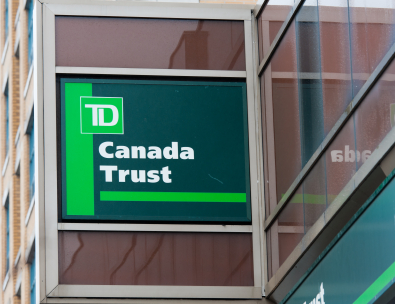Confusion and angst. That’s what TD caused with its 45-basis-point 5-year posted rate hike on Friday.
But as it turns out, no other banks matched it, at least not yet. Unless you’re a TD customer, the bank’s gambit should have limited ill effects.
Status Quo with the Stress Test
TD’s monster move had no impact on the mortgage qualifying rate (MQR) this week, which the Bank of Canada kept at 5.14% on Wednesday.
The fear was other banks might follow TD and make the government’s mortgage stress test significantly harder to pass.
The reason the MQR didn’t change was twofold:
- BMO and Scotiabank hadn’t announced posted rate hikes by the Bank of Canada’s 11:30 A.M. polling cutoff yesterday (Wednesday).
- CIBC shrewdly hiked its 5-year posted to 5.14%, causing the MQR to remain at 5.14% (thanks to the government’s mode average calculation method).
Stay Tuned Next Week
The MQR could move next week if/when BMO and Scotiabank announce new rates. It they hike, we’ll put our money on the MQR going to 5.34%.
That would be a 20-bps increase, which isn’t the end of the world. A 20-bps hike to the benchmark 5-year fixed rate means a 1.5 per cent reduction in homebuying power, give or take.
Analysis from TD Economics a while back suggested a 20-bps rate hike results in a 0.20 percentage point “permanent decline in existing home sales.” But the psychological damage of this week’s ominous rate hike headlines may be worse than the actual reduction in qualified borrowers.
The Takeaway
This week’s rate hikes do little on their own to upset the housing apple cart. If Poloz and company jack up rates another 75-125 bps or so, then we’ll start worrying.
That said, if you’re shopping for a mortgage, big bank fixed-rate hikes may incrementally add to your borrowing cost burden, especially if you’re a TD customer.

 log in
log in
 Confusion and angst. That’s what TD caused with its 45-basis-point 5-year
Confusion and angst. That’s what TD caused with its 45-basis-point 5-year
5 Comments
My mortgage is coming up for renewal in July. $295k remaining mortgage and a 2.79% current 5yr fixed rate. I’m worried that’s going to jump big time. I’m not crazy about the idea of going variable though. Might it be worth looking at shorter terms (3 or 4 year)? Or is it still better to lock in for 5 years again to avoid potentially higher rates in the coming years, even if the rate is higher?
Confused, Is your present mortgage default insured? What is your home worth? Any possible need to break the mortgage before 5 years? Stable finances?
My husband and I are first time home buyers. We purchased a pre-contruction property and anticipate the closing to take place near the end of the year. This will be the first time we apply for a mortgage and would’t you know with our luck TD has jumped their rates leaving us worried about what will follow suit in the months to come. This is our Dilemma. TD has teamed up with this specific builder/project and is able to lock in rates for 6 to 12 month period. That being said, I have shopped around other alternative places and have found rates for five year fixed to be way lower, but rates with them can only be locked for 90 days or 120 at the most. As it is anticipated that rates may jump again before the end of the year do i lock in with TD or hold out and see what others have to offer me closer to the closing date so I can see if there is a more competitive rate that can be offered? I feel like TD is lowballing me on the fixed rate because they know they are re the only ones who will hold that rate for a longer period of time. I have excellent credit, no debt and put down 20% down payment on that property. Help! We are worried and confused.
Hi W & C,
The best rates require a close in 90-130 days or less. Reason being, it’s much more expensive for lenders to hedge their rate exposure beyond this timeframe. Moreover, a smaller percentage of long-term rate holds actually close, which means the lender is usually hedging and incurring expenses for nothing.
The best play is to:
1) Get a quote from the builder’s partner bank for the rate hold you need
2) Compare it to other Big 6 banks
3) Lock in the best long-term rate hold you can to protect yourself against rising rates
4) Shop for a better rate once you’re 30-90 days from closing. (Get a rate hold that’s at least 30 days longer than your estimated closing date, in case the closing gets pushed back.)
Thank you for your advice! You’ve given me some peace of mind.